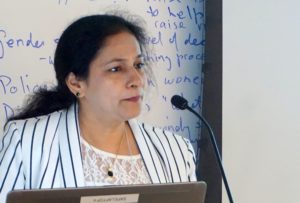Why gender matters in fisheries economics and trade
 The following statement was developed from a lively lunch time discussion @ IIFET-2018, 19 July 2018. It was compiled by Meryl Williams, Carmen Pedroza, Arpita Sharma, Mark Axelrod, Dale Squires, Stella Williams, Ayojesutomi Solanke, Kafayat Fakoya, Holly Hapke, Kate Barclay, Achini De Silva, Sarah Harper, Chikondi Pasani, Marysia Szymkowiak and Rashid Sumaila
The following statement was developed from a lively lunch time discussion @ IIFET-2018, 19 July 2018. It was compiled by Meryl Williams, Carmen Pedroza, Arpita Sharma, Mark Axelrod, Dale Squires, Stella Williams, Ayojesutomi Solanke, Kafayat Fakoya, Holly Hapke, Kate Barclay, Achini De Silva, Sarah Harper, Chikondi Pasani, Marysia Szymkowiak and Rashid Sumaila
Why will incorporating gender concepts and gender theory help improve fisheries, aquaculture and fish trade economics? The IIFET-2018 discussion proposed the following reasons.
- Gender-aware analysis provides deeper economic understanding
- As women make up nearly half the fish sector workforce, and sectoral work is often differentiated by gender, incorporating the gender dimension would improve the analyses of the impacts of changes, e.g., in policy, industry organisation, social factors and climate.
- In economic analysis, gender should not be treated as a simple binary exogeneous variable. Instead, the intersectional feminist concepts of gender should be considered. These concepts recognise that characteristics of women; men, youths (more than 50% of the world population is less than 30 years old) such as behavioural differences, life stage, culture, education, income level, occupational group and other differences, when considered along with sex-differences, construct more useful gender categories that may accord with power relations and the motivations of actors.
- Incorporating gender into fisheries economics will help dispel gender myths about who participates in the sector and help broaden the focus to include more than the resource side. Women and other under-recognised groups, such as small scale and indigenous fishers, and attention to the full value chain impacts will be included for more comprehensive modelling.
- Gender is not just a matter for research but is also an issue among those who do fisheries economics. At IIFET-2018, 38% of presenters were women, many of whom met to discuss and share career experiences and offer advice. IIFET is recognized as a women-friendly Institute, as shown by participation, the sex of ExCom members, and recent prize winners. IIFET is therefore well-positioned to “walk the talk” in fostering more gender-aware research.
-

Dr Mark Axelrod speaks out at the “Why gender matters in fisheries economics and trade” discussion, 19 July 2018.
Women’s labour should be counted in fish value chains
- Women are particularly concentrated in pre and post-harvest work and enterprises, often small in scale. Their contribution to the fisheries economy is significant, even if it may not match their proportion of the workforce due to the nature and scale of their occupations. Projects, models and policies that fail to take half the labour force into account are likely to overlook key issues that also impact on prices, costs, markets, and power relations in governance, opportunities and sustainability. For example:
- How is gender inequality (through low wages and unpaid work) subsidising fishing and what are the impacts on MEY?
- Should non-market gendered work, such as unpaid care and reproductive work in fishing communities, be recognised in fisheries economic models?
- How does gender discrimination in working conditions affect fisheries?
- Gender is significant at the micro-level of decision making in the sector, whether on vessel and enterprise economics or in decisions on and responses to management. These issues need to be incorporated when interpreting modelling outcomes.
- Law, policy and management suffer from gender-blindness
- Internationally and nationally, numerous conventions, strategies and targets espouse gender equality, e.g., United Nations Strategic Development Goal #5. Governments often don’t genuinely subscribe to policies they sign. Fisheries economists can play an important role in raising this as a policy issue affecting many in fish value chains and stress the need for action to help address the targets.
- Gender economic conference sessions inevitably stress the need to dramatically improve sex-disaggregated data collection and research. Fisheries economists also should be pressuring for the collection of reliable, regular sex-disaggregated data as this would improve IIFET member opportunities for wider collaboration with more consistent data.
- Gender-based analysis, added to existing analyses, would provide a base for better regulations and impact assessment.
Overall, we conclude that integrating a gender perspective into fisheries economic research can generate a deeper understanding of economic processes and can result in a total analysis of welfare.
Signed: Meryl Williams, Carmen Pedroza, Arpita Sharma, Mark Axelrod, Dale Squires, Stella Williams, Ayojesutomi Solanke, Kafayat Fakoya, Holly Hapke, Kate Barclay, Achini De Silva, Sarah Harper, Chikondi Pasani, Marysia Szymkowiak, Rashid Sumaila
